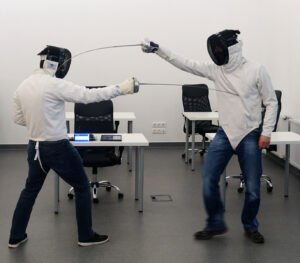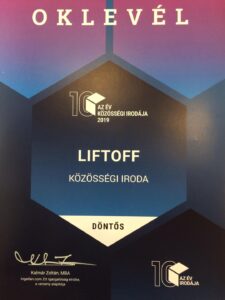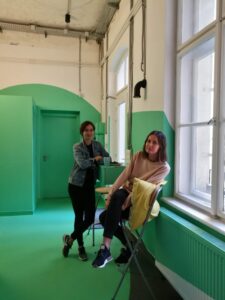A Hungarian startup's mobile app could revolutionise hit marking in fencing
The Calibur Fencing team has been the first to arrive and the last to leave Lifoff for weeks. Their new development aims to make fencing a much more accessible sport and get it out of the traditional fencing halls.
It is a wireless hit detection system, which is much simpler than a traditional hit detection system. It can provide a simple solution for practicing fencers who cannot afford a traditional hit detection system. COVID has only amplified this need.
We asked Tibor Kákonyi, one of the founders of Calibur, over our morning coffee.
Tell us about the project in a few words
We have teamed up to develop a specific product: a smart hit detection system for fencing. The basic problem we started from is that the hit detection machines used in fencing are physically large, heavy devices that are connected to the fencer's weapon via wires and are therefore very complicated to use. There are wireless systems, but they are very expensive and very inaccurate. Our aim is to replace it with an innovative solution that is software-based, i.e. we implement hit signalling using a mobile application that can run on any ordinary digital device, a smartphone or tablet that communicates via Bluetooth with a small hardware device that is connected to the bullhorn and sends the signals to the application in case of a hit. What's really new for the fencer is that the results are sent directly to the
 are saved on the app, allowing the athlete's performance and progress to be tracked.
are saved on the app, allowing the athlete's performance and progress to be tracked.
Is the device only for training or is the aim to take over the role of the scoring system in competitions?
In the longer term, we would like to be able to use it at all levels of the sport, but in the first instance, until it works with perfect stability and accuracy, it can be used in training conditions.
How is the team put together? Who is from where?
It depends on who we consider to be part of the team, it changes dynamically. Strictly speaking, we are three founders: Adam Nagy, Andris Kovács and myself. Andris is an electrical engineer, I'm a mobile app developer, Adam is a data scientist, he's now retired from day-to-day active work for a while due to his PhD studies. We knew each other personally before the project started and the motivation for the project was that we were all three active fencers before. In the summer we were joined by Ferenc Tanács, lawyer and Valentin Varga, manager, and now the project is moving forward under his leadership, which has brought a big step forward in the life of the project. And a couple of weeks ago we added Ádám Szőke, a mechanical engineer, who is still being integrated into the team.
Why fencing?
I was inspired by personal experiences, having been a fencer myself for 10 years. Andris sword fought for a decade. So the idea itself was too obvious, why not implement the hit signal with an app and then later I found the motivation beyond emotions. I went to school from Devecser to Ajka and to fencing in Tapolca, which meant a lot of travelling and this made it difficult for me to continue my fencing career successfully, the main reason being that the infrastructure for the sport was very difficult to access. This personal experience motivated me and the plan was that with our equipment, anyone could turn any room into a vivoting space at an affordable price.
How is the project now?
Two weeks ago we successfully completed and closed the first 3-month development phase. The purpose of this period was to prepare for a large-scale beta testing, Valentin contacted several fencing clubs around the world. The feedback from fencing clubs has been very positive, we have selected 20 fencing clubs who will actively test the prototypes at their training sessions over the next month and provide ongoing feedback to support product development. Importantly, they were already willing to pay for it, which validates the business side of the concept. During this one month, we gather useful feedback and use the feedback to develop the final, commercially viable product.
When do you plan to do this?
Now it will be a longer process of several months, we will do another similar round of beta testing, during which we plan to make the system work not only for duels, but also for at least one other weapon.
Any other impact of COVID on the project?
Partly it makes testing more difficult, but partly it creates an extra need to take fencing out of the traditional fencing arena.
What is your aim with the project in the short and long term?
We want to revolutionise the hit signal in fencing. As we look at the bigger brands, they have a lot of products that we can replace with smart features that we can build into the software, so if we're fast enough, I think we have a good chance of going global.

Why did you choose a Community office?
The main motivation was that the previous location had very limited time availability. A startup needs to operate in a much more dynamic way than the normal 8am-5pm working hours. It is also much more unpredictable how much time you have to work. It was very important to be able to come into the office at any time from Monday to Sunday, because we are also developing hardware, and the work cannot be done entirely remotely. Teamwork is also more efficient because we are in the same space.
Another big advantage of the community office is that it takes the burden of running the office off your shoulders, so you can focus on the real business of the company in 100%. Also, Liftoff itself is very well located and easily accessible, with a very pleasant atmosphere.
Video: https://youtu.be/Jhc3LRwip6g
Facebook: https://www.facebook.com/calibur.fencing
Webpage: www.caliburfencing.com




